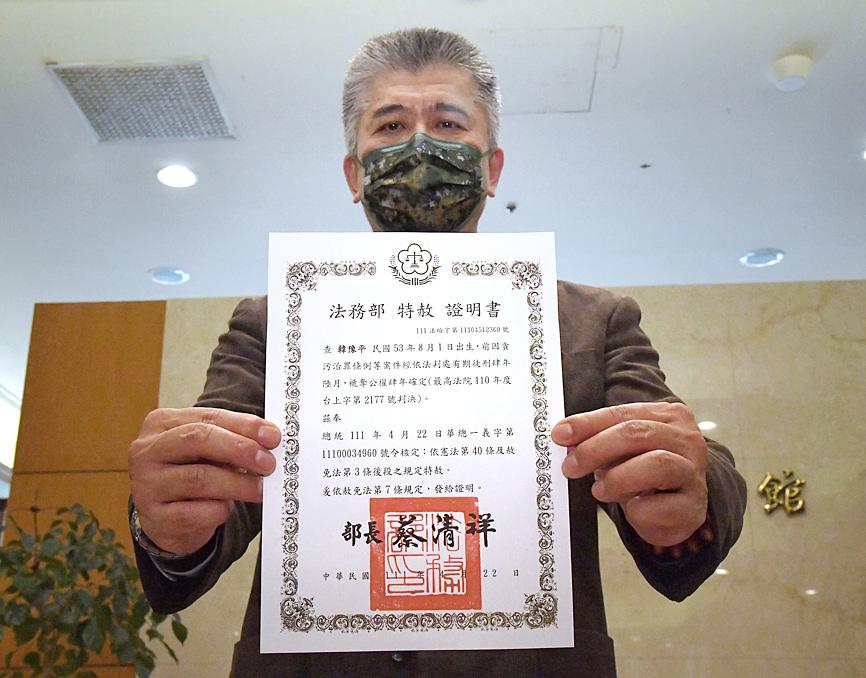President Tsai Ing-wen (蔡英文) yesterday pardoned retired army general Han Yu-ping (韓豫平) and army sergeant Chang Yu-sen (張淯森), who were sentenced to prison for using NT$2,880 (US$98.43 at the current exchange rate) from a bonus payment to pay for a banquet for members of their unit.
The presidential pardon revoked their conviction on corruption charges, to confirm with the principle of proportionality between crime and punishment, and in recognition of their service to the nation, Presidential Office spokesman Xavier Chang (張惇涵) said.
Han and Chang Yu-sen were stationed at the Hualien and Taitung Defense Command in 2015, as chief of staff and administrative clerk respectively, when they allegedly used the money from a bonus payment to pay for a banquet for fellow soldiers, including Political Warfare section chief Kuo Shou-yu (郭守寓), who brought along his wife and two children.

Photo: Tien Yu-hua, Taipei Times
They were accused of contravening the Ministry of National Defense’s restrictions on meal expenditures, resulting in their indictments under the Anti-Corruption Act (貪污治罪條例) and Criminal Code of the Armed Forces (陸海空軍刑法).
Han was sentenced to four years and six months in prison, while Chang Yu-sen was sentenced to one year in jail. The Supreme Court rejected their appeals in a final verdict on Feb. 9.
Han’s retirement pension was reduced by half due to the conviction.
“They did not take public funds for their own personal use,” Xavier Chang said in a statement, adding that the civilians attending the banquet were all dependents of a member of the military.
Although they made “an error in judgement” in contravening administrative regulations, the punishment was disproportionate to their crime, “and does not conform to the public’s expectations of justice in law,” he said.
Veterans Affairs Council Deputy Director Lee Wen-chung (李文忠) thanked Tsai for the pardon, saying it brought a “good ending” to a “regrettable case.”
The Chinese Nationalist Party (KMT) said in statement that the pardon was “belated justice” for an issue that “adversely affected the morale of our troops.”
“The Ministry of National Defense must swiftly clarify regulations regarding meal and food expenditures, and change outdated aspects of the rules that are not applicable to such situations, so our members of the armed forces can have clear regulations and laws to follow, and to prevent such an incident from happening again,” it said.
Yesterday’s pardons were the second and third of Tsai’s presidency.
The first was on May 20 last year, when she pardoned Bunun hunter Tama Talum (王光祿), convicted in 2015 for killing a Reeves’ muntjac and a Formosan serow with a modified shotgun.
Additional reporting by Jason Pan

DEFENSE: The National Security Bureau promised to expand communication and intelligence cooperation with global partners and enhance its strategic analytical skills China has not only increased military exercises and “gray zone” tactics against Taiwan this year, but also continues to recruit military personnel for espionage, the National Security Bureau (NSB) said yesterday in a report to the Legislative Yuan. The bureau submitted the report ahead of NSB Director-General Tsai Ming-yen’s (蔡明彥) appearance before the Foreign and National Defense Committee today. Last year, the Chinese People’s Liberation Army (PLA) conducted “Joint Sword-2024A and B” military exercises targeting Taiwan and carried out 40 combat readiness patrols, the bureau said. In addition, Chinese military aircraft entered Taiwan’s airspace 3,070 times last year, up about

Taiwan is stepping up plans to create self-sufficient supply chains for combat drones and increase foreign orders from the US to counter China’s numerical superiority, a defense official said on Saturday. Commenting on condition of anonymity, the official said the nation’s armed forces are in agreement with US Admiral Samuel Paparo’s assessment that Taiwan’s military must be prepared to turn the nation’s waters into a “hellscape” for the Chinese People’s Liberation Army (PLA). Paparo, the commander of the US Indo-Pacific Command, reiterated the concept during a Congressional hearing in Washington on Wednesday. He first coined the term in a security conference last

A magnitude 4.3 earthquake struck eastern Taiwan's Hualien County at 8:31am today, according to the Central Weather Administration (CWA). The epicenter of the temblor was located in Hualien County, about 70.3 kilometers south southwest of Hualien County Hall, at a depth of 23.2km, according to the administration. There were no immediate reports of damage resulting from the quake. The earthquake's intensity, which gauges the actual effect of a temblor, was highest in Taitung County, where it measured 3 on Taiwan's 7-tier intensity scale. The quake also measured an intensity of 2 in Hualien and Nantou counties, the CWA said.

The Overseas Community Affairs Council (OCAC) yesterday announced a fundraising campaign to support survivors of the magnitude 7.7 earthquake that struck Myanmar on March 28, with two prayer events scheduled in Taipei and Taichung later this week. “While initial rescue operations have concluded [in Myanmar], many survivors are now facing increasingly difficult living conditions,” OCAC Minister Hsu Chia-ching (徐佳青) told a news conference in Taipei. The fundraising campaign, which runs through May 31, is focused on supporting the reconstruction of damaged overseas compatriot schools, assisting students from Myanmar in Taiwan, and providing essential items, such as drinking water, food and medical supplies,